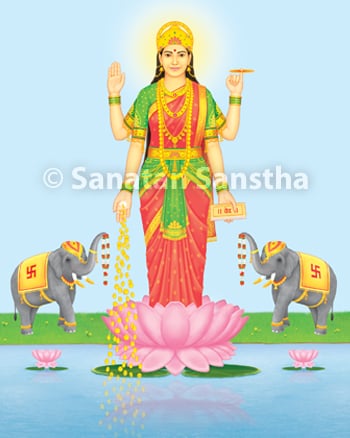
Tithi
Ashvin Amavasya (New moon day of the month of Ashvin)
Lakshmi-puja
Normally the new moon day is considered inauspicious; however, this particular new moon day is an exception. Though this day is considered auspicious, it is not so for all events. Hence, it would be more appropriate to call it a joyful day instead of an auspicious day.
History
A legend has it that on this day Shri Vishnu alongwith Devi Lakshmi liberated all Deities from Bali’s captivity.
Method of celebrating Lakshmi-puja

After a mangalsnan at the break of dawn, we should worship the Deities. In the afternoon parvanshraddh (rite for the departed ancestors) is performed, Brahmans are offered meals; in the evening in a pandal decorated with creepers and leaves Devi Lakshmi, Shri Vishnu, Deity Kuber and other Deities are worshipped. When performing Devi Lakshmi-puja an idol of Devi Lakshmi should be installed on a seat, on which either an eight-petalled lotus or a swastik (symbol representing the Principle of Divine Energy) is drawn with akshata. At some places a tamhan (shelving dish) is placed on a kalash and the idol of Devi Lakshmi is installed on it. Next to Her, an Idol of Deity Kuber is placed. Then all these Deities, including Devi Lakshmi, are offered naivedya prepared from cow’s milk with sugar, cardamom and cloves added to it. Items like coriander, jaggery, popped rice, sugar candies etc. are offered to Devi Lakshmi and then distributed to well-wishers and friends. Holding a torch of dried twigs in the hand guidance is offered to ancestors (The torch is pointed in the southern direction). Brahmans and the hungry are offered meals. It is advised that we should keep awake in the night. The Purans narrate that on the new moon night of Ashvin, Devi Lakshmi wanders in search of an ideal home. Though undoubtedly cleanliness, beauty and excellence attract Her, yet She loves to live in a home inhabited by men who are faithful, dutiful, merciful, righteous, have control over passions and are devotees of God, and women who are virtuous and chaste.’ Coriander seeds and popped rice are used in this puja. Coriander seeds denote wealth and the popped rice denote prosperity. A few grains of uncleaned rice when heated can yield a handful of popped rice. To acquire prosperity as a blessing from Devi Lakshmi, the popped rice symbolising prosperity, is offered.
Worship of Devi Lakshmi and Devi Saraswati to eliminate ego and to cleanse ourself
Devi Lakshmi is worshipped on Kojagiri Pournima (full moon day of the month of Ashvin) and Ashvin Amavasya (new moon day of Ashvin). This indicates that these days are in fact auspicious.

1. Prayer unto Devi Lakshmi
At the time of Lakshmi-puja we should place the account books before Her idol and pray thus, “O Devi, we have used the wealth bestowed by You, for the service of the Absolute Truth and for the Divine mission. We are placing before You the completed accounts. Please approve of them. Let our mission continue smoothly in the coming year too.” “The Lord, who provides me with Chaitanya (Divine Consciousness) to cater to my needs, who is a part of every mission that I undertake, dwells within me. So He too is my partner. The account of whatever I acquired throughout the year and the way it was put to use, has been reflected in these books to the very last penny. I have placed it today before You for scrutiny. You are the witness. I can hide nothing from you. Ever since You came to stay with me, I have respected You and used You only for God’s mission. O Devi Lakshmi, You are unblemished and pure, that is why I have never used You for any unrighteous act.” “All this was possible for me only because of the co-operation of Devi Saraswati. She has never allowed my discretion to waver. It is because of this that my moral strength has not waned. My family and I have enjoyed happiness and satisfaction. I made the expenditure remembering God and received His co-operation. I am always mindful that ‘You will leave me if I do not put You to rightful use. Therefore O Devi, I pray that You recommend me to God, to approve of the expenditure incurred by me; but for Your recommendation, He will not approve of it. I will try not to repeat the mistakes that come to my notice. Therefore, O Devi Lakshmi and Devi Saraswati, bestow me with Your grace and let me make the best use of wealth throughout my life, for the welfare of the society.”
2. Puja of Devi Saraswati
‘Then the One who is the favourite of artists, Hansavahini (One who rides a swan), Dnyanswarupini (One who Herself is the intellect form), One who is the bestower of knowledge to the intellectuals and One who keeps the power of discretion activated so that wealth earned is put to rightful use, that is Devi Saraswati should be worshipped.’ – H.H. Parashram Madhav Pande Maharaj, Sanatan Ashram, Devad, Panvel.
Kojagiri Pournima and Lakshmi-puja
It has been specified that Deities Lakshmi and Indra be worshipped during the festival of Kojagiri Pournima and Deities Lakshmi and Kuber be worshipped on Lakshmi-puja day, that is Ashvin Amavasya.
Devi Lakshmi and Kuber
Devi Lakshmi is the Deity of wealth, whereas Deity Kuber is the treasurer. Several people possess the art of earning money; but since they do not know how to save it, they incur unnecessary expenses and have no savings. In fact, far more important than earning money is saving it, guarding it and spending it at the right place. Deity Kuber is the Deity who teaches the art of saving money, as He Himself is the treasurer. Therefore, in this ritual the worship of Devi Lakshmi and Deity Kuber has been recommended. All people, especially the business community celebrate this festival with great enthusiasm and splendour.
Alakshmi nissaran (Removal of poverty)

Importance
Development of virtues gains importance only if in the process defects are overcome. We have just discussed remedies to acquire Lakshmi (wealth). This has to be complemented with removal of alakshmi (poverty). Hence, a new broom is purchased on this day. It is called ‘Lakshmi’.
Practice
It has been said that, ‘At midnight one should sweep the house with that broom, collect the dust in a dust pan and throw it out’. This is called ‘alakshmi nissaran’. Sweeping the house and throwing the dust out at night is forbidden on other nights. It is done only on this particular night. Sweeping here is sometimes accompanied by beating of the winnow and a dimdi (an earthen vessel covered with a hide) to drive away alakshmi.
Video : Ritualistic worship of Shri lakshmi
Reference : Sanatan’s Holy Text ‘Holy festivals, Religious festivals and Vowed religious observances’
#diwali diwali #diwali2022 diwali2022 #deepawali deepawali #deepawali2022 deepawali2022 #deep deep #lakshmipoojan #laxmipoojan lakshmipoojan laxmipoojan #akashkandil akashkandil #narakchaturdashi narakchaturdashi #padwa padwa #bhaubeej bhaubeej #bhaidooj bhaidooj #bhaidooj2022 bhaidooj2022 #bhaubeej2022 bhaubeej2022

 Shri Shivashankar Swamiji of Shri Siddharudh Shiv Mandir, Nagpur, pays a goodwill visit to Sanatan Ashram in Ramnathi
Shri Shivashankar Swamiji of Shri Siddharudh Shiv Mandir, Nagpur, pays a goodwill visit to Sanatan Ashram in Ramnathi On the occasion of Makar Sankranti (14th January 2025)
On the occasion of Makar Sankranti (14th January 2025) A festival of harmony and unity !
A festival of harmony and unity ! Important update in ‘Sanatan Prabhat’ app; ‘Search’ feature available now
Important update in ‘Sanatan Prabhat’ app; ‘Search’ feature available now Appoint devotees in temples, not politicians seeking rehabilitation
Appoint devotees in temples, not politicians seeking rehabilitation ‘Kavi Kalidas Sanskrit Sadhana’ award increased to Rs 1 lakh
‘Kavi Kalidas Sanskrit Sadhana’ award increased to Rs 1 lakh